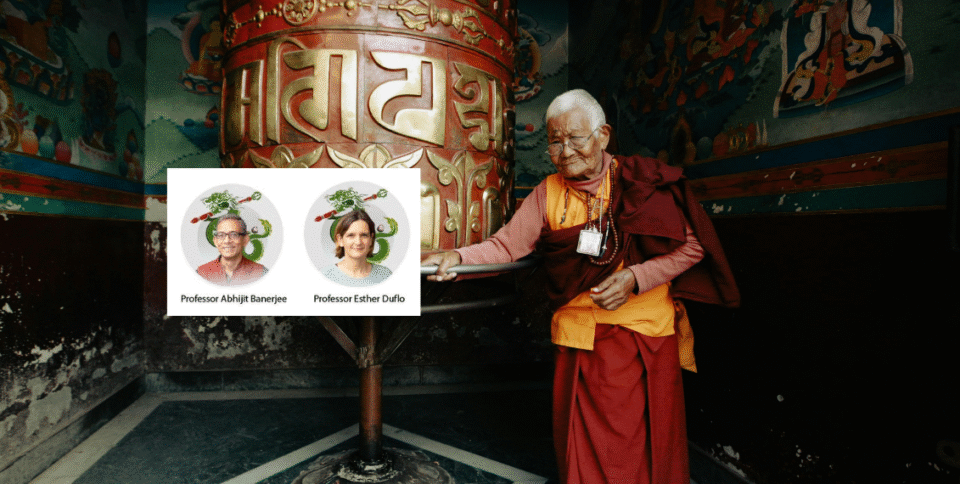Thimphu, August 5: Bhutan’s unconventional development model—where well-being, environmental preservation, and cultural identity take precedence over GDP—has long intrigued economists and policy thinkers. That conversation got a global spotlight when two of the world’s leading development economists, Nobel Laureates Professor Abhijit Banerjee and Professor Esther Duflo, visited Bhutan recently.
During their appearance at Drukyul’s Literature and Arts Festival, hosted by Bhutan Echoes, the co-founders of the Abdul Latif Jameel Poverty Action Lab (J-PAL) sat down with Kuensel to share their insights on Bhutan’s path and its potential in a world increasingly shaped by economic uncertainty, climate change, and technological upheaval.
The duo, who also co-authored Poor Economics and Good Economics for Hard Times, lauded Bhutan’s multidimensional approach to progress. Rather than questioning whether Bhutan’s model outperforms traditional growth paths, Duflo suggested focusing on how well it works on its own terms.
“If the question is whether this model is better than the strict Washington Consensus, it becomes difficult to answer, because Bhutan never took that path,” Duflo said. “Instead, ask: how do you do the best with the path you have chosen?”
That means measuring not just income, but indicators like physical and mental health, education quality, and community well-being—metrics that often get sidelined in more conventional models.
A Rethink on Economic Diversification
While countries are frequently advised to diversify their economies, Banerjee and Duflo both argued that Bhutan should think differently. Bhutan’s reliance on hydropower and agriculture is often seen as a vulnerability. But Banerjee challenged this notion, pointing out the country’s favourable geography and natural resources.
“It’s not clear to me that Bhutan needs to diversify out of agriculture,” he said. “With fertile land and regular rainfall, high-value crops for the global market are a real opportunity.”
Duflo echoed that optimism regarding hydropower. “Having abundant and clean electricity is like sitting on a gold mine,” she said, praising Bhutan for developing its energy infrastructure without harming rivers or ecosystems.
Rather than diversifying away from these assets, she suggested doubling down: “Make those sectors work as wholes, sustainably and intelligently.”
She warned against rushing into industrialisation, which many countries did only to end up trapped in competitive, low-margin sectors with high environmental and social costs.
Humility, Detail, and Policy That Listens
For countries charting their own course, both economists highlighted the importance of grounded policy design. Banerjee criticised the impulse to react to crises with half-baked quick fixes.
“There is always this urgency—‘we must solve this now’—but that often leads to the wrong answers,” he said. “It’s much more powerful to say: we don’t know yet. Let’s find a process that helps us learn.”
Duflo added that many well-meaning policies fail because decision-makers are too far removed from what’s actually happening on the ground. “The devil of good policies is in the details,” she said.
Youth Unemployment and the AI Disruption
On the increasingly visible problem of youth unemployment in Bhutan, Banerjee pointed to the broader global context. Artificial Intelligence is transforming job markets everywhere, and young people are often left unsure about where they fit.
“AI is changing the game. Employers are hesitant. We need to ask: what kinds of jobs will survive AI?” he said. He suggested that sustainable agriculture and artisanal crafts could be more resilient than white-collar desk jobs, which may be among the first to vanish.
Duflo underlined the role of vocational training, contrasting the approaches of France and Germany.
“In France, not going into academics is seen as failure. In Germany or Switzerland, vocational tracks are respected.”
She referenced a Norwegian programme that helped young people develop business ideas, not necessarily to start businesses but to rebuild confidence and direction.
“It’s about giving them the experience of seeing an idea through. That in itself gave them the self-belief to apply for jobs,” she explained.
Culture, Identity, and the Fragility of Social Fabric
As Bhutan attempts to balance tradition with modernisation, the economists urged caution. Banerjee warned that social cohesion can unravel quietly, especially as younger generations shift their values.
“We assume the social fabric is intact because people still say the right things. But rising loneliness and elder neglect in places like India show that something deeper is breaking,” he said.
Duflo added that cultural continuity has immense, often underestimated, value. “The food people grew up eating, the traditions they belong to—those are sources of happiness. We often only realise how much when they’re gone.”
Banerjee pointed to the way social media can devalue traditional knowledge. “Young people come to see local crafts or farming as backward. But what if there’s nothing else? Or what if the alternatives don’t bring satisfaction either? If we don’t value what’s valuable, neither will they.”
Bhutan’s Choice
For Banerjee and Duflo, Bhutan stands as a rare example of a country that has not been swept up in the global race for GDP at all costs. That makes its journey harder to benchmark—but perhaps more valuable as a case study in alternative development.
As the country faces new pressures—from climate risks and automation to youth aspirations and social change—the challenge will be holding onto what works, improving what doesn’t, and resisting the urge to imitate for the sake of conformity.
“There’s wisdom in Bhutan’s path,” Duflo said. “The real question is how to keep walking it—carefully, creatively, and without losing sight of why it was chosen in the first place.”

